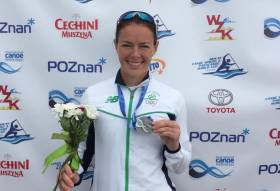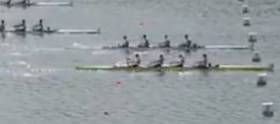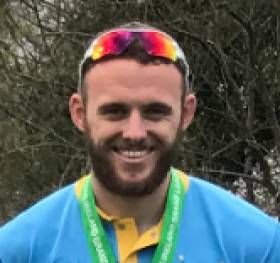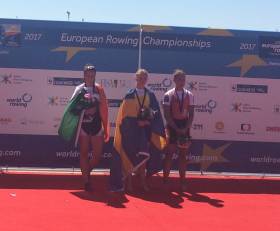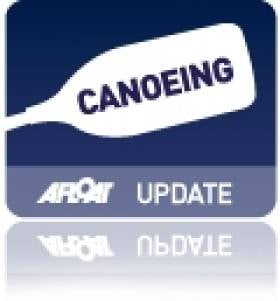Displaying items by tag: silver
Silver Medal for Jenny Egan at World Cup in Poznan
#Canoeing: Ireland’s Jenny Egan had another podium finish at a World Cup today. She took silver in the K1 5,000 in Poznan in Poland. Egan and Inna Hryshchun on the Ukraine broke clear of the rest of the field after the second portage. The two disputed the gold and silver placings, with Egan missing out by just over half a second.
Barry Watkins took seventh in the men’s K1 5000, while Ronan Foley took 14th.
Canoe Sprint World Cup, Poznan, Poland (Irish interest)
Saturday
Men
K1 1,000 – B Final (Places 10 to 18): 8 Barry Watkins
K1 500 – B Final (Places 10 to 18): 8 Watkins.
Women
K1 200m – Semi-Final Three (7-9 to C Final): 7 Jenny Egan. C Final (Places 19 to 27): 5 Egan
Paracanoeing: VL3 Men’s 200m – Semi-Final One: 3 Patrick O’Leary. KL3 Semi-Final: 4 O’Leary
Sunday
Men
K1 5,000 – Final: 7 Watkins, 14 Ronan Foley.
Women
K1 5,000 – Final: 1 Ukraine 25:31.548, 2 Ireland (Egan) 25:32.112, 3 Slovakia 25:51.496.
Silver in Thriller For Ireland at European Junior Rowing
#Rowing: Ireland took a silver medal in Essen this morning at the European Junior Championships. Germany held on as Ireland mounted a sprint finish which might have taken gold – it fell short by .3 of a second.
The Ireland coxed four of Matt Gallagher, James O’Donovan, Jack Dorney, John Kearney and cox Leah O’Regan won their heat ahead of Germany, who took the race to them this time. The hosts led through most of the 2,000 metres, but could not get more than half a length ahead of the Irish.
Turkey came through for bronze, ahead of Russia.
European Junior Championships, Essen, Germany (Day Two, Irish interest)
Men Junior Four, coxed – A Final: 1 Germany 6:19.88, 2 Ireland (M Gallagher, J O’Donovan, J Dorney, J Kearney; cox: L O’Regan) 6:20.18, 3 Turkey 6:22.12.
Murphy Adds Gold in New Zealand
#Rowing: Max Murphy added a gold medal to the silver he had won in the men’s senior pair at the New Zealand Rowing Championships today. The UCD oarsman was part of the Waikato senior eight which were clear winners, beating a crew from their own club into second. Kevin Neville and Eamon Power of NUIG were in the Wellington crew which took bronze.
In warm and calm conditions, Paul O’Donovan and Gary O’Donovan finished fourth in the Premier double sculls, an elite event won by Chris Harris and Robbie Manson.
New Zealand Rowing Championships, Lake Karapiro, Day Four (Irish interest)
Men
Eight – Senior
Final: 1 Waikato (3 M Murphy) 5:56.41; 3 Wellington (7: K Neville; 8 E Power) 6:00.28.
Pair - Senior
Final: 2 Waikato (M Murphy, T Bedford) 6:59.41.
Sculling,
Double – Premier
Final: 4 Skibbereen (P O’Donovan, G O’Donovan) 6:38.66. Senior – B Final: 1 Wairau (2 K Neville) 6:46.04.
Single – Club
B Final: 5 Wairau (E Power) 8:11.15.
O'Donovans Sprint to Silver at World Cup Rowing
#Rowing: Paul O’Donovan and Gary O’Donovan took a silver medal at the World Cup Regatta in Poland this morning. The Ireland lightweight double took second in an exciting race. France led from early on and were never headed. Ireland came from sixth to hold second by 1500 metres – but coming up to the line they came under severe pressure from China and Poland, who took the bronze.
World Cup Regatta, Poznan, Poland, Day Three (Selected results; Irish interest)
Men
Lightweight Double Sculls – A Final: 1 France (P Houin, J Azou) 6:12.40, 2 Ireland (G O’Donovan, P O’Donovan) 6:15.33, 3 Poland (J Kowalski, M Janknowski) 6:15.90; 4 China One 6:16.17, 5 Germany 6:17.67, 6 Japan Two 6:17.99.
Women
Pair – B Final: 1 United States 7:22.54, 2 Ireland (A Keogh, A Crowley) 7:30.09.
Single Sculls – B Final: 1 Ireland One (S Puspure) 7:28.79, 2 United States Two (M O’Leary) 7:29.35, 3 Ireland Two (M Dukarska) 7:32.34; 4 Germany Two 7:36.36, 5 United States One 7:37.43, 6 Austria Two 7:40.21.
#Rowing: Ireland made a brilliant start to the final day of the European Rowing Championships.
Mark O’Donovan and Shane O’Driscoll dominated the men’s lightweight pair to take gold and, immediately afterwards, Denise Walsh took a gutsy silver medal in the lightweight single sculls.
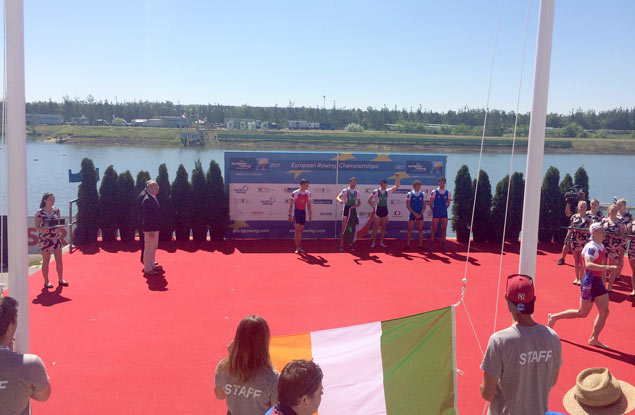 Mark O'Donovan and Shane O'Driscoll medal ceremony
Mark O'Donovan and Shane O'Driscoll medal ceremony
European Rowing Championships, Day Three (Selected Results; Irish interest)
Men
Lightweight Pair – A Final:
1 Ireland (M O’Donovan, S O’Driscoll) 6:32.34, 2 Russia 6:34.74, 3 Italy 6:34.89; 4 Britain (J Cassells, S Scrimgeour) 6:39.75.
Women
Lightweight Single Sculls – A Final: 1 Sweden (E Fred) 7:36.24, 2 Ireland (D Walsh) 7:38.00, 3 Switzerland (P Merz) 7:39.94.
Medals for Irish Kayakers at Athens Special Olympics
The Irish team returned to a warm welcome last week after their success at the Special Olympics World Summer Games in Athens, winning an incredible total of 107 medals - 31 of them gold.
The medal haul included a number in kayaking, with Ruairi O'Toole of Corrib Canoe Club taking gold in the men's 200m and second place in the men's 500m, which beats his previous best of bronze at the Special Olympics in Dublin in 2003.
O'Toole was followed closely by Shaun Bradley from Letterkenny, who won silver in the 200m and placed fourth in the 500m.
In women's kayaking, Teresa Maguire of Moore Abbey was Ireland's start turn with silver in the 200m and bronze in the 500m, while Celine Mulready of the Free Spirit club wasn't far behind with a 200m bronze and fourth place in the 500m.


























